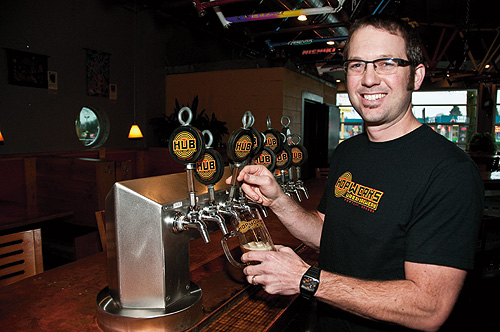 Oregon brewers are signing on to help with water restoration in the Deschutes River.
Oregon brewers are signing on to help with water restoration in the Deschutes River.
 |
Christian Ettinger, brewmaster of Hopworks Urban Brewery. // PHOTO BY TERESA MEIER |
Oregon brewers are signing on to help with water restoration in the Deschutes River.
The Bonneville Environmental Foundation’s Water Restoration Certificate program, launched a few months ago to help companies reduce their water footprints, began reaching out to breweries because of their intensive water use in producing and bottling their products.
The breweries agree to purchase water credits for $1 apiece, which represents 1,000 gallons of water. The funds from these Water Restoration Certificates are collected by the foundation, which then gives the money to the Deschutes River Conservancy. The conservancy then works with river groups to repair antiquated water irrigation systems, which helps keep more water in the river during peak usage.
“It’s a very sophisticated program modeled after our renewable-energy certificate and carbon-offset programs,” says Pam Devee of Bonneville. “What we’re trying to do is to get folks to look at their water footprints and try and come up with ways to reduce it.”
Hopworks Urban Brewery of Portland was the most recent brewery to sign up; it bought $1,800 worth of credits in September, which will help restore 1.8 million gallons of water over 12 months. The brewery joins four others: Laurelwood Brewery, Widmer Brothers Brewing and Lompoc Brewing, all based in Portland, and the Block15 brewery in Corvallis.
“We jumped on it when we heard about it,” says Hopworks brewmaster Christian Ettinger. “Within a week we had a deal signed.”
Widmer Brothers signed on to the program in June 2010, committing to restoring around 8 million gallons over the next three years at a cost of $8,000.
“Water is of critical importance to us, and we are really fortunate to be brewing in this area,” says co-founder Rob Widmer.
“[Breweries] understand that water is one of their main ingredients and they need to be conscientious about it,” says Devee. “They need to be able to say [to their communities], ‘We’re on the ball, and we’ve got it covered, folks.’”


